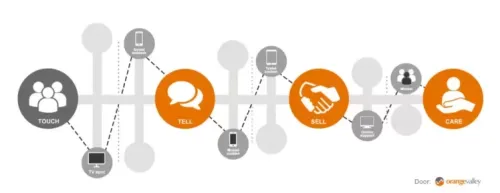"Human behavior and technology are merging."
Now that we have loaded this page in 1.21 seconds, according to Microsoft, we should share our message with you within eight seconds, as stated on the website of TIME Magazine.
However, various neuroscientists reject this claim. Looking at the insights from Follo, we see that personal intention determines the level of attention. Your intention to stay informed about trends likely makes you scroll further to the next paragraph.
What should you not miss before you have properly started 2018? The following 10 online marketing trends for 2018!

Online marketing trend 1: Do you know (your customer's guilty pleasure)?
"Putting the customer first is always logical but never self-evident," a striking quote from the blog customer first by my colleague, Dennis van der Biezen. You put the customer first in (medium) large organizations based on data. This is because it is (unfortunately) not possible to know all your customers personally.
Data should ensure that you take insights about the target audience and customer needs as a starting point. How do marketing teams do that?
One in three organizations uses data for better targeting of audiences and/or customers. Who do you reach when, where, and with what message? That's where data helps you. Marketing teams increasingly use data to predict what audiences and/or customers want. In other words, what the (expected) behavior of the target audience is. Predicting, for example, 'banner acceptance', but also the automated writing of an optimal AdWords ad text aimed at the target audience, is now possible.
Trend 2: The power of all touchpoints together

At Follo, we see that insights at the individual touchpoint or channel level are increasingly enriched with insights into the entire customer journey. The total of insights from all touchpoints together. The integration of current (marketing) systems is an important driver for this. An example of this is the integration named 'Dreamforce'. This is the full integration of Salesforce with Google Analytics.
Besides tools, it is the structures, processes, and people that actually turn data into value for the customer and thus the organization itself. For this, you need data expertise in your team.
[Full text is adjusted in the same way, replace 'OrangeValley' with 'Follo' and correct any small spelling errors]




